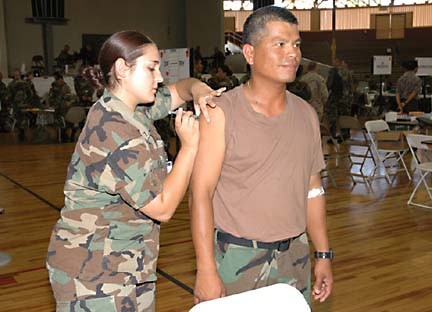

|
Preparing to deploy
Medical specialists work to streamline
screenings for departing soldiers
ARMY Spc. Jane Degal finally got all her medical clearances this week to deploy with the Hawaii Army National Guard's 29th Infantry Brigade.
But it took several trips to Tripler Army Medical Center before she was given the green light.
"It's a relief," said Degal, who enlisted in the Hawaii Army National Guard soon after graduating from Farrington High School in 2001. "There was a lot of waiting and two trips to Tripler for several tests."
Since December, medical and administrative specialists have set up shop at Schofield Barracks' Conroy Bowl to try to speed up soldier readiness processing, which covers everything from wills and pay issues to issuing immunizations.
Master Sgt. Matt Momiyama, the noncommissioned officer from Tripler who helped set up the screening stations, said generally these medical and administrative checks are done by the deploying units.
"However, when the division got word that it was deploying, said Momiyama, 45, "that meant all of its medical assets were deploying; so my general at Tripler was asked to help."
"Those first few days when we started in December were the toughest," he added. "Although we planned everything; we even walked it through several times ... when we started processing people, we had to make changes to makes things flow smoothly. We are still modifying it to make it better."
More than 10,000 soldiers from the 25th Division bound for Iraq and Afghanistan had to be cleared before they left in late January and mid-March.
That was followed in August by the mobilization of 2,100 Hawaii Army National Guard and Army reservists.
Col. David Ellis, commander of the Schofield Barracks Health Clinic, said the Army had until the middle of last week to identify any medical problems that would prevent the National Guard and Army reservists from deploying.
Ellis estimated that generally it would take a soldier about three hours to clear the 20 administrative and medical stations set up at Conroy Bowl.
"But, during a face-to-face interview with a doctor, issues may come up, so the three hours may turn to five or six hours."
Medical screenings include audiology; blood tests; immunizations; eye exams; mental health checks; pharmacy prescriptions written for six-month supplies of any chronic medical problems; and a review of a soldier's medical records to ensure the soldier is deployable.
Degal, 22, said her initial screening was done by specialists at her unit, the 29th Brigade's Headquarters & Headquarters Company. That check came up with several items which made her nondeployable until she received clearances from the doctors at Tripler.
Capt. Dion Kaimihana, Hawaii Army National Guard lawyer, said his physical examination disclosed that he had slight hypertension coupled with low pulse.
"They gave me medication and I am good to go," said Kaimihana, a 1989 Kamehameha Schools graduate.
But Pvt. Lawrence Concepcion, who has just completed basic and advanced training, needed six immunizations before he was cleared to join his unit, the 411th Engineer Combat Battalion, which has been in Baghdad since March.
Momiyama said that once all the National Guard and Army reservists have been screened, he doesn't expect to conduct more than three sessions at Conroy Bowl each month to take care of replacement soldiers.
"However, when the 25th redeploys and returns next spring," Momiyama said, "we will have to set up these stations again. There are just as many requirements when they redeploy as when they deploy."
More than 80 Tripler personnel were tapped for this job, Momiyama said.
Capt. Pamela King, who commands a four-member in-processing operations cell, said she had to draw 50 administrative specialists from Schofield and other Army installations to help the deploying soldiers take care of their nonmedical needs.
Ellis said part of the medical process is to ensure that a soldier's medical records are as current as possible and entered into Medpros, the Army's national medical data bank.
"That means no matter where the soldier goes," Ellis added, "the Army can access his records -- even when he is in theater (like Iraq) -- using this Web-based system."
Since December, the Army reports that 14,000 soldiers, including 3,000 reservists, have been screened. More than 23,000 immunizations have been given, while 12,000 soldiers needed lab work. Dental clinics at Tripler and Schofield performed 990 checkups, while 2,600 eye exams were administered.
www.dod.state.hi.us/hiarng/index.html